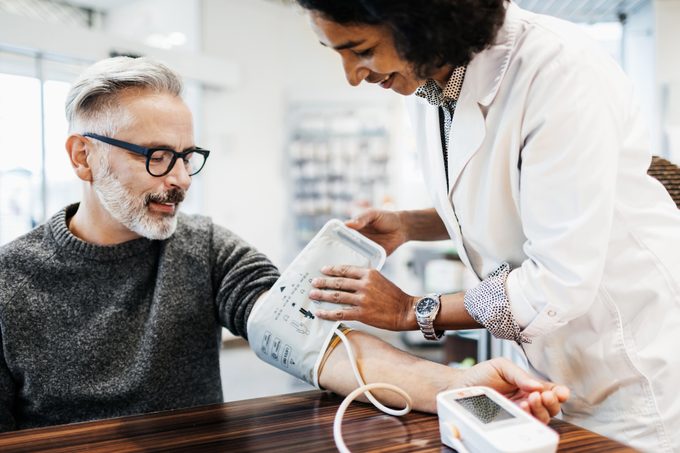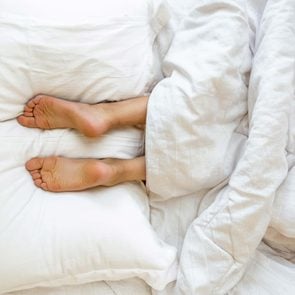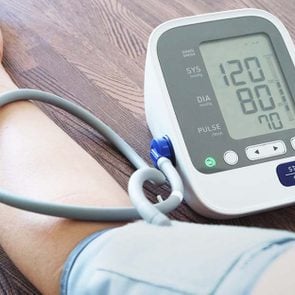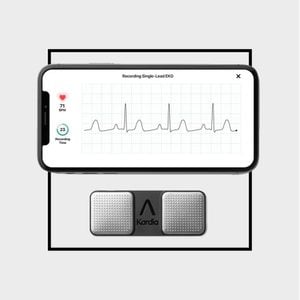Does High Blood Pressure Make You Tired?
Updated: Oct. 10, 2022
If you have high blood pressure and feel tired, you're not alone. Experts explain the link between blood pressure and fatigue.
The link between high blood pressure and fatigue
Do you have a lingering, overall feeling of being tired and it just doesn’t go away? If you have high blood pressure, you may find yourself feeling more fatigued than normal.
While high blood pressure doesn’t always cause symptoms, there are many potential ways that it can lead to fatigue, including medication side effects and increased workload on your heart, explains Guy L. Mintz, MD, director of cardiovascular health & lipidology, Northwell Health’s Sandra Atlas Bass Heart Hospital, Manhasset, New York. (Here are the medical reasons you’re tired all the time.)
Systolic blood pressure is the upper number in a blood pressure measurement. It refers to how much pressure your blood is exerting against your artery walls when your heart beats. The lower number, diastolic pressure, refers to how much pressure your blood is exerting against your artery walls when your heart is resting. A blood pressure of less than 120/80 mm Hg is considered normal.
“Blood pressure is the resistance that the heart pumps against,” says Dr. Mintz. “If a patient has persistent elevation of blood pressure, fatigue can occur.”
High blood pressure forces your heart to work harder, and like any muscle, your heart grows bigger with more work. The bigger your heart, the more it demands blood, but the less able it is to maintain blood flow.
This is how high blood pressure leads to heart failure that can leave you feeling tired and unable to exercise. Heart failure is a chronic condition in which the heart becomes enlarged and pumps blood inefficiently, and that can lead to fluid accumulation in your limbs and lungs.
Here’s what you need to know about whether high blood pressure makes you tired, as well as expert tips on how to combat fatigue and keep healthy blood pressure.
Blood pressure medication and fatigue
Certain blood pressure medications, including beta-blockers and calcium channel blockers, list fatigue as a side effect, says Dr. Mintz. These side effects may diminish over time.
You should never stop taking your potentially life-saving medication without consulting with your doctor. If fatigue is bothering you, ask your doctor to adjust the dose or even change the time that you take it so that you feel more energized. (Here are other reasons why you may have no energy.)
Stress can cause high blood pressure too and make it harder for you to do the things you should do to stay healthy including taking your medication as directed.
High blood pressure tends to go hand in hand with obesity and lack of physical activity, both of which can leave you feeling tired, Dr. Mintz says. But as little as 10 minutes of walking or cycling can boost the quality of your sleep, lower blood pressure, help you shed extra weight, and leave you feeling more energetic, the National Sleep Foundation notes.
Sleep apnea, high blood pressure, and fatigue
Sleep apnea, which is marked by pauses in breathing while sleeping, can cause high blood pressure, Dr. Mintz adds.
“Patients also get fatigue because of the sleep apnea which causes hypertension,” he says. When pauses in breathing occur, oxygen levels go down, which may lead to an increase in blood pressure.
Sleep apnea robs you (and likely your partner, since snoring is a common symptom) of restorative sleep, leading to daytime fatigue.
Treating underlying sleep apnea may improve fatigue and lower your blood pressure levels, says Dr. Mintz. Treatment may involve the use of a continuous positive airway pressure (CPAP) device that administers air pressure through your nose while you’re asleep. There are some home remedies for sleep apnea as well.
If you think you have sleep apnea or your partner complains about your snoring, talk to your doctor about the next steps.

Other causes of fatigue with high blood pressure
With high blood pressure, the force of blood flowing through your blood vessels is consistently too high. Untreated and over time, this force can damage the blood vessels and cause heart disease, stroke, kidney failure, and/or vision problems.
Here’s a closer look at some of the conditions that can cause fatigue:
- Coronary artery disease: High blood pressure can cause narrowing or blockage of the arteries, which can affect blood flow.
- Peripheral arterial disease: Hypertension can lead to the narrowing of arteries located in the legs, stomach, arms, and head, which can cause leg pain and cramping.
- Enlarged heart: High blood pressure forces the heart to work harder, which like any muscle, grows bigger with more use.
- Heart failure: High blood pressure can narrow and block blood vessels, making it difficult for the heart to circulate enough blood to the body. Heart failure is a chronic condition.
- Kidney damage and kidney failure: High blood pressure affects blood flow to the kidneys and can potentially damage the tiny blood vessels in the kidneys. This can impair their ability to filter blood and lead to kidney failure.
Preventative care
The best ways to get ahead of high blood pressure and related fatigue includes:
Knowing your numbers
Blood pressure can be measured in the doctor’s office or at home. When it comes to measuring blood pressure at home, technique matters, says Vijay Nambi, MD, associate professor of medicine (athero and lipo), Baylor College of Medicine, Houston. Make sure to do it in a quiet spot with your feet on the ground. “The correct cuff size is important because if it’s too big, it can affect the accuracy of the reading.” (These are the best home blood pressure monitors on Amazon.)
If your blood pressure is high, discuss the numbers with your doctor. Lowering blood pressure starts with eating a healthy low-salt diet, engaging in regular exercise, and maintaining a normal weight. Watch out for these high blood pressure foods in your diet.
These lifestyle changes are sometimes all that it takes to get your numbers where they need to be, but medication may still be needed for many people, says Dr. Nambi. Exercise, in particular, will have spillover benefits on your fatigue. (Here’s how to add more exercise to your sedentary lifestyle.)
Sleeping on it
Setting and sticking to a sleep schedule, even on weekends, can help you get better rest so you feel more refreshed during the day. The National Sleep Foundation recommends seven to nine hours of sleep for adults aged 18-64 and seven to eight hours for adults aged 65 and older. Make sure your bedroom is cool, dark, and conducive for sleep.
Before bed, don’t engage in anything stressful—whether watching the news or paying bills. How can you tell if you got a good night’s sleep? You will wake up feeling refreshed, alert, and ready for the day.
The last word
Fatigue can occur with high blood pressure for many reasons, but you don’t have to have symptoms to have high blood pressure, says Dr. Nambi.
Always discuss how you are feeling with your doctor to see what is causing the fatigue, and find ways to improve your energy throughout the day—while also keeping blood pressure in the normal range.
“Headache, tiredness, dizziness, and nosebleeds are all possible, but most people with high blood pressure are not symptomatic,” cautions Dr. Nambi.
If you have symptoms and your blood pressure is very high, seek care, especially if you have chest pain or numbness as these can indicate a high blood pressure emergency.



